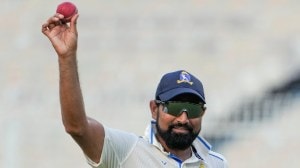India asleep while Iraq enters a new phase
The new Iraqi constitution was approved by about 78 per cent of the Iraqis with Sunni Arabs voting overwhelmingly against it. Iraq went to p...

The new Iraqi constitution was approved by about 78 per cent of the Iraqis with Sunni Arabs voting overwhelmingly against it. Iraq went to polls on October 15 to vote on a new constitution, the first in a series of events that in the next several months will decide the success or failure of the US attempt to unite the country under a new political system. In a way, the entire US national security strategy is in line as turning Iraq into a functioning democracy has been the centerpiece of the Bush Administration8217;s foreign policy for the last three years.
The ground situation in Iraq remains extremely complicated, however. A political accord among Iraq8217;s various ethnic and religious communities is crucial for a cessation in insurgent violence. But even the US military is now openly acknowledging that the present Iraqi constitution does not resemble even close to a national compact and the Sunni minorities are expressing their opposition to it by all means. Sunni insurgents have used this opportunity to further stoke the fires and are killing Shiite majority in great numbers. Shiite militia and death squads are resisting with ordinary Iraqis caught in the crossfire.
There are many flaws in the proposed Iraqi constitution but the most serious is its facilitation of a de facto partition of Iraq into several mini-states. Minority Kurds plan to preserve the territories they control in northern Iraq and add to it the oil-rich city of Kirkuk. Shiite leaders have also their own plans for a nine-province region in southern Iraq that, with its own constitution, courts, and security forces would control some of the world8217;s largest oil fields. Sunnis are left behind with nothing similar and as such are the disgruntled group. The United Nations has warned that the new constitution is a model for the territorial division of Iraq. The Arab League also views it as a precursor to a civil war in the country.
The danger is that the Sunnis might now have an enduring sense of grievance and even moderate Sunnis would be convinced that violence is the only way to redress their grievances. There was a strong turnout among the Sunni Arab minority, which largely boycotted January8217;s parliamentary elections and found itself damagingly under represented in the writing of this constitution. This time, Sunnis voted in large numbers, and overwhelmingly voted no. All three provinces with Sunni majorities voted against the constitution. They won solid majorities against the constitution in three provinces but they fell short of the two-thirds threshold in the third.
The results of the constitutional referendum underscored the deep divisions along ethnic and sectarian lines in Iraqi society, a condition that has fueled a violent insurgency against the government and the US occupation forces. It is becoming clear with each passing day that the Iraqi society at its most basic level has been ruptured, perhaps irreparably. Not only are Shia displacing themselves to be among their own kind but many Sunnis are also fleeing Shia areas even when they do not support the insurgents.
Despite this, the Bush Administration continues to hope that Sunnis voting in large numbers in the constitutional referendum is a sign that they are interested in joining the Iraqi political process, thereby sidelining the insurgents. And the US has now turned its attention to the December elections to replace the current interim government and elect a new National Assembly. There also seems to be some commitment on the part of the dominant Shiite and Kurdish parties to open the constitution to significant amendments after the next round of elections in December.
Even as Iraq has entered a new phase amidst all-round churning, India, the largest democracy in the world, has decided that the best policy vis-a-vis Iraq is to have no policy at all. India is yet to announce its Ambassador for Iraq and its mall mission in Iraq is being headed by a charge d8217; affairs. India has, time and again, made tall claims about helping Iraq to become a stable and prosperous state. But nothing concrete has come out of such pious rhetoric.
In fact at one point it seemed that with a new government in Baghdad ready to roll out the red carpet for Indian businessmen, India8217;s once thriving economic ties with Iraq, which took a hit after the US-led invasion in 2003, were poised to bounce back. But there was a complete lack of initiative on the part of the India and progress on the economic front has been tardy. Given the high rating of the Indian companies in the Iraqi market and the traditional warm relations between the two countries, Indian companies could have easily cornered a huge chunk of that business.
India had offered 20 million in assistance to Iraq when the United Nations Secretary General, Kofi Annan had appealed to the global community to help Iraq in 2003. But the details of that assistance remain murky and it is not clear what follow-up action was taken by India in this regard. India8217;s special envoy to Iraq, C.R. Gharekhan did go to Iraq in May but his visit only produced some sound-bites. For a country that has 8216;8216;great power8217;8217; aspirations, India8217;s lackluster response to events in its extended neighborhood is indeed a travesty. Events in the next few days and months will define the contours of the Middle East for years to come and it is still not too late for India to carve out its own strategic agenda. Merely reacting to events around it is not a sign of a confident global player.
The writer is with the Department of Defence Studies at King8217;s College, London. Email: hpantnd.edu
- 01
- 02
- 03
- 04
- 05






























